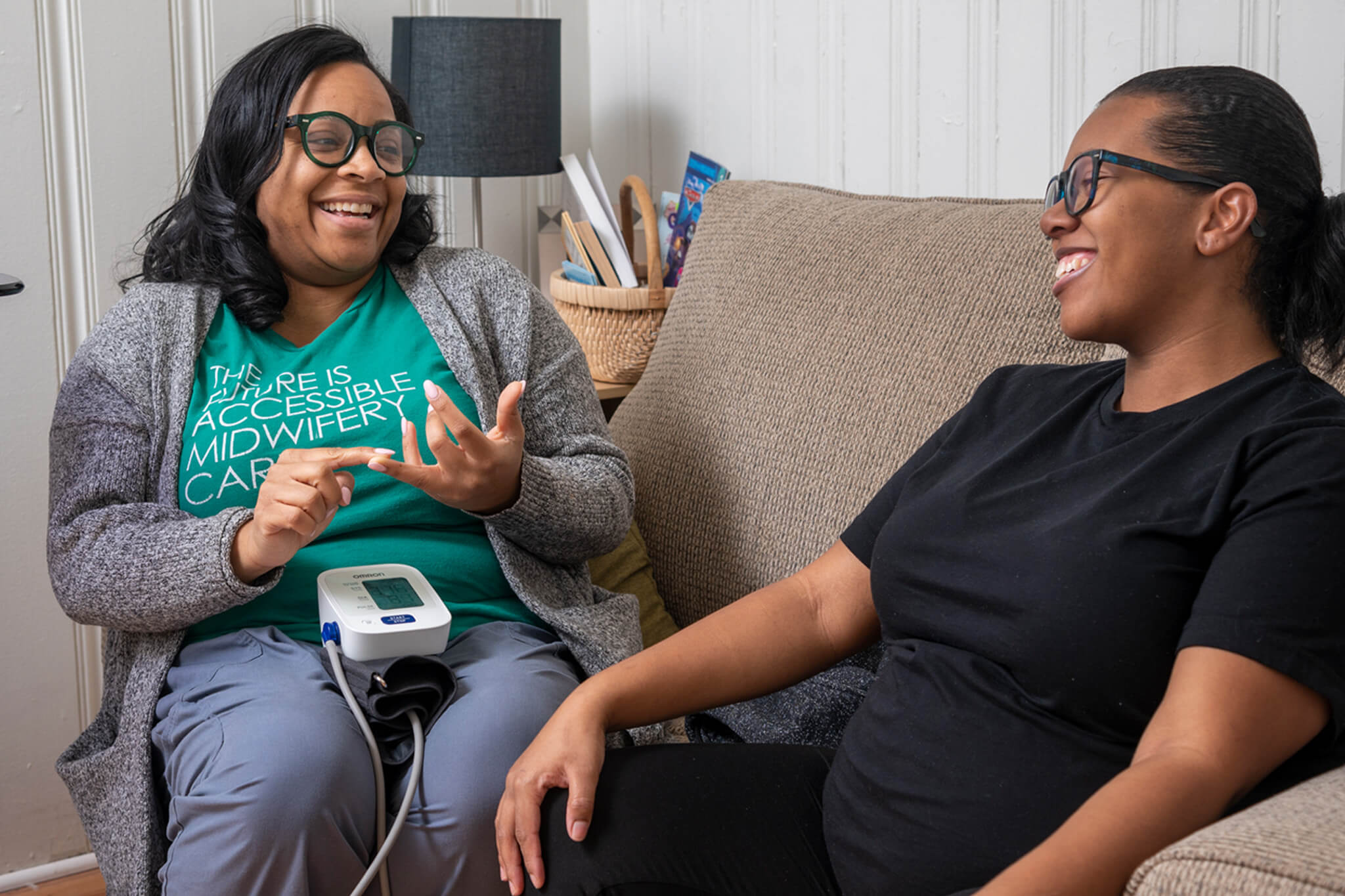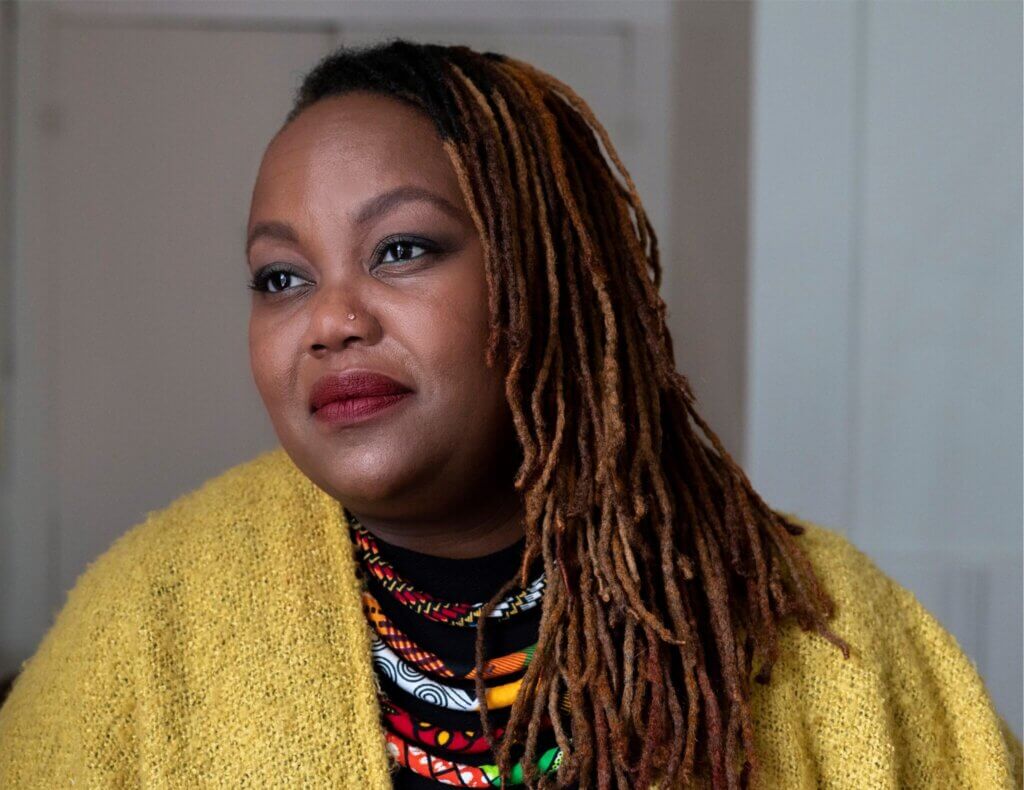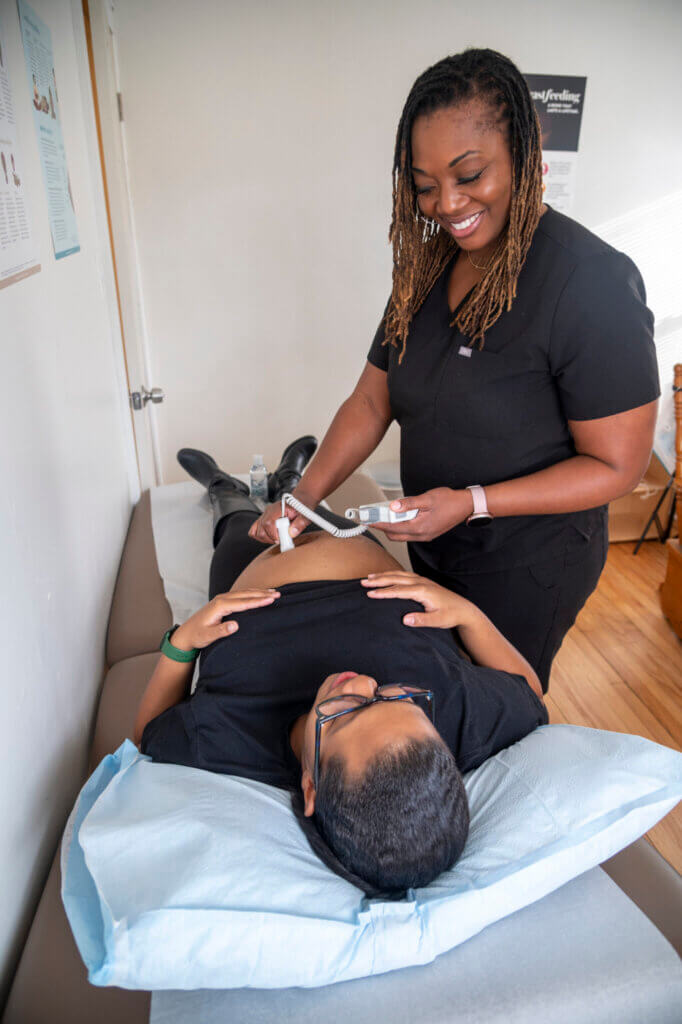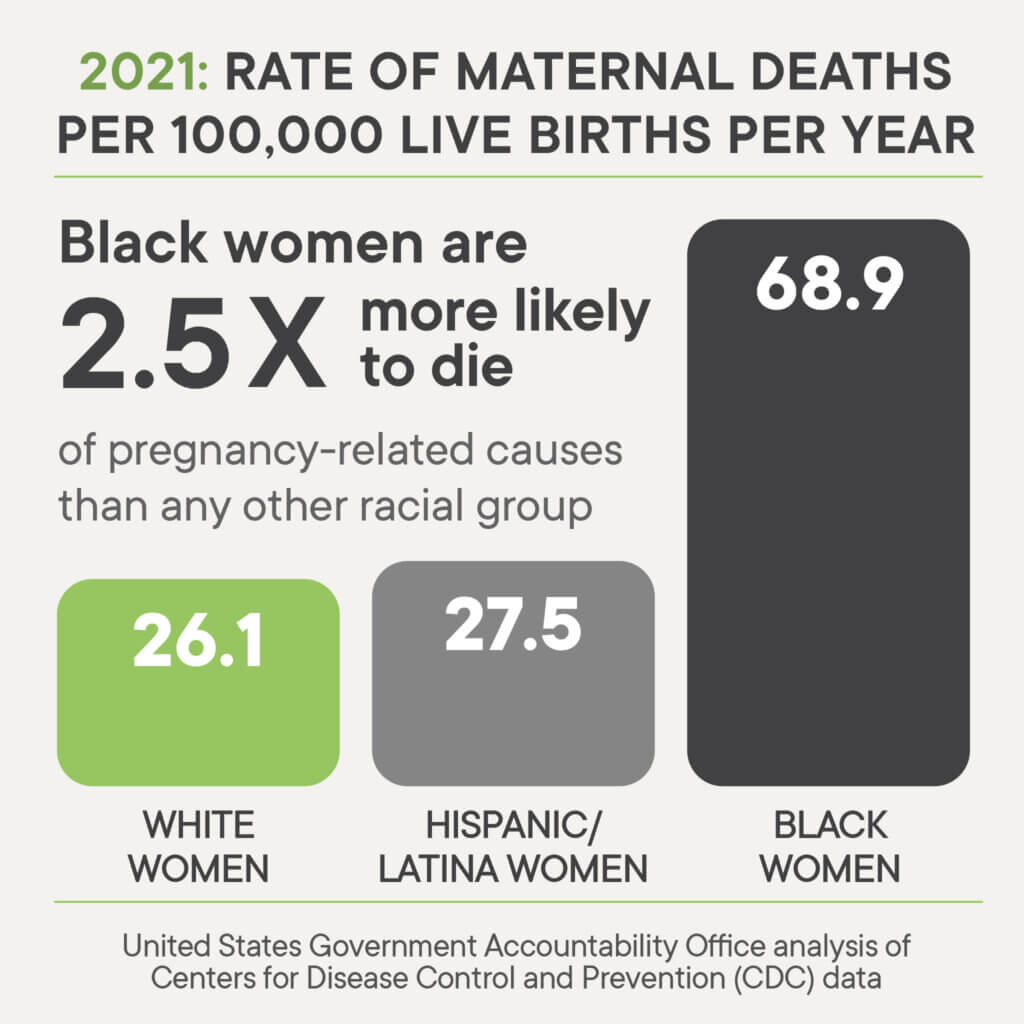
Birth Detroit co-founder and birth doula Elon Geffrard chats with expecting mom Tajzha Davis. “Whatever you need, they’ll help you with it,” Davis says of Birth Detroit, a Community Foundation for Southeast Michigan partner. Photo credit: Darrel Ellis
The United States is experiencing a maternal health crisis.
Our maternal mortality rate is the highest of any developed nation — with most of these pregnancy-related deaths considered preventable. During the COVID-19 pandemic, maternal health outcomes worsened for all women in the U.S., and long-standing health disparities persisted.
For example, Black women are nearly three times as likely to die due to pregnancy-related causes as white women in the United States. Disparities in other adverse outcomes — such as preterm and low-birthweight births, as well as infant mortality — also exist for Black women, according to Centers for Disease Control and Prevention data.
Other women of color also experience maternal health disparities in the United States. For example, the maternal mortality rate among American Indian and Alaska Native women is twice that of white women.
The situation is so urgent that, in 2021, the current presidential administration identified the maternal health crisis as a priority and called for landmark investments in care. In June 2022, the administration followed up with a Blueprint for Addressing the Maternal Health Crisis.
Racism causes disparities
These stark truths illustrate the impact racism has on maternal health — and the imperative to create more equitable experiences and outcomes. The Community Foundation for Southeast Michigan is committed to supporting nonprofits throughout our region that are working to close this gap.
These groups include Black women-led organizations such as Mothering Justice, the Black Mothers’ Breastfeeding Association and Birth Detroit. The Community Foundation also manages an agency endowment fund for Planned Parenthood – Detroit Health Center, which provides culturally responsive, equitable and accessible reproductive health care.
An endowment fund is part of a pool of assets that are invested for long-term growth. The Community Foundation manages more than 230 of these agency endowments for nonprofits throughout southeast Michigan.
These organizations, each in their own way, work to address the inequities that cause maternal and infant health disparities. Structural racism — in the forms of provider discrimination and implicit bias resulting in poorer-quality care, increased health risks from the chronic stress of racism, and income inequality — are among the key drivers. Causes also include differences in health insurance coverage and access to health care, transportation, affordable housing and child care.

“It makes a difference in our communities to see ourselves reflected in care and to have our life experience understood.” — Birth Detroit co-founder Leseliey Welch
The research does not suggest there are underlying biological or genetic differences that would cause such disparities.
“Notably, disparities in maternal and infant health persist even when controlling for certain underlying social and economic factors, such as education and income, pointing to the roles racism and discrimination play in driving disparities,” a Kaiser Family Foundation report says.
The causes of maternal health disparities are well-documented, but so are the solutions.
Research indicates that expanded access to coverage and care, paid family leave, investment in communities of color, a more diverse perinatal workforce, improved data collection, educating providers on racism and implicit bias, and providing culturally appropriate, midwife-based care in community birth settings can reduce maternal and infant health disparities and costs.
“It makes a difference in our communities to see ourselves reflected in care and to have our life experience understood,” Birth Detroit co-founder Leseliey Welch says. “It really makes a difference in the experience of care to have autonomy and respect, to feel listened to, to feel heard.”
‘The atmosphere is different’
When expecting mom Tajzha Davis enters the sunny welcome area at the Birth Detroit Care clinic, the Black women-led midwife team surrounds her with love.
“How was your day?” her midwife asks warmly. “Would you like a bottle of water?”
Before her exam, the pair settle onto a comfy couch to talk about how Davis, who is eight months pregnant, has been feeling. Nearby, a colorful play space is stocked with toys so Davis and other moms can bring their older children if needed.
As the women chat, another midwife takes a call from a client who’s having car trouble and offers to arrange a ride so the client can make her appointment. Each visit lasts 30-60 minutes and can include education, nutritional counseling and conversations about the patient’s goals for care.
“It’s really nice being here because the atmosphere is different. It’s an intimate setting, not just this 15-minute appointment, like you’re in and you’re out. We actually sit down – you can breathe – and talk for a second. Whatever you need, they’ll help you with it,” Davis says. “It feels good to know you have people like you, who can give you the care you need and understand where you’re coming from, because not everybody may understand.”
Detroit’s first birth center
Welch spent most of her career before Birth Detroit working in public health. She noticed something curious: While maternal and infant health disparities were universally acknowledged, the power of midwifery care to reduce or eliminate them was not.
“All the data and evidence suggest that the midwifery model of care makes a difference, that birth center care makes a difference in preterm births, low birthweight, breastfeeding and client satisfaction,” Welch says. “Yet there were no birth centers in the city of Detroit. So, we set out to change that.”

Birth Detroit midwife Elikem Amable-Brumfield examines expecting mom Tajzha Davis. The Community Foundation for Southeast Michigan supports Birth Detroit’s work to provide culturally appropriate care that can reduce maternal health disparities. Photo credit: Darrel Ellis
In 2018, Welch joined forces with midwives Char’ly Snow and Nicole Marie White, as well as birth doula Elon Geffrard, to co-found Birth Detroit. The team had two key goals: to establish the first Black-led birth center in the majority Black city of Detroit, and to reduce maternal and infant health disparities.
The team surveyed nearly 400 community members during 2018-2019 to gauge interest in a Birth Detroit Birth Center, and 98% of respondents supported the idea. A capital campaign is underway to raise funds for the freestanding birth center, where women can give birth surrounded by safety and love, with culturally relevant care in a home-like setting.
This approach views low-risk pregnancy and childbirth as a natural process rather than an emergency that requires medical intervention. It’s considered suitable for upward of 80% of birthing people and is more common outside of the United States.
Meanwhile, to meet the community demand for its services, Birth Detroit launched Birth Detroit Care. The community-based maternal health clinic operates out of the homey second-floor flat in northwest Detroit where expecting mom Tajzha Davis received her care. Birth Detroit Care offers prenatal and postpartum care provided by midwives, as well as childbirth education and postpartum support.
The Community Foundation’s most recent grant to Birth Detroit supported a new clinical director position to lead programming expansion and midwifery team development ahead of the Birth Detroit Birth Center’s opening.
Value women and children
Birth Detroit’s work extends beyond providing direct care to advocating for policies that will reduce maternal and infant health disparities. These include expanding birth center licensing, reimbursing midwifery care, extending Medicaid coverage for postpartum people for one year after a baby’s birth, removing barriers to create equitable access to capital, and forming partnerships between freestanding birth centers and integrated health care systems.
Birth Detroit also has partnered with community organizations — including fellow Community Foundation grantee Mothering Justice — to form The State of Birth Justice collaborative. The group works to build urban-rural partnerships to increase access to midwifery care across the state of Michigan.
“Meeting the needs of the most marginalized, you create something better for everyone,” Welch says. “Studies show that birth centers led by Black women not only are protective for Black birthing people, but produce a better birth experience for all people. “The challenges we see, and the disparities in outcomes, are the results of a society that doesn’t value women and children,” Welch says. “If we value all birthing people and children equally, and we understand family autonomy and comprehensive reproductive health care as essential, we will do so much better for our families.”
This story first appeared in the Spring 2023 REPORT Newsletter

